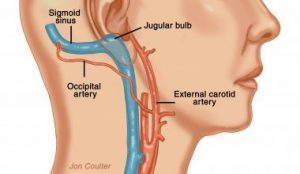
Here are some of the common underlying causes of pulsatile tinnitus. The doctor may also be able to hear the rhythmic sounds upon examination. To understand why pulsatile tinnitus has occurred, the ears will be examined and other tests may be carried out. Once the sinuses have cleared and improved, such as after a cold, the ear noise should dissipate.

For instance, having blocked sinuses can cause fluid to accumulate near the back of the eardrum, which can create a pulsing sound in the ears.
Hearing heartbeat in ear and having high blood pressure professional#
What causes pulsatile tinnitus?īecause some of the causes of pulsatile tinnitus can relate to serious underlying health conditions, it’s always worth consulting a professional if you suspect you have this problem.Ĭhances are the problem is benign and could go away by itself. If this condition is a result of an underlying problem, then other symptoms may also be present. Symptoms can seem worse during the quiet of the night, and sufferers often report difficulty sleeping because of it, as well as finding it hard to concentrate during the day. Hearing a heartbeat-like sound in the ears can be normal after exercise, but with pulsatile tinnitus, the noise can be heard even without doing any physical activities. Sufferers often find that the beating noise in their ears matches the speed of their heartbeat, so that the noise in the ear increases when their heart rate goes up, and vice versa. This sound may be constant, or it could come and go. What differentiates pulsatile tinnitus from regular tinnitus is that there is a beating or rhythmic sound, which is often described as like a heartbeat, or in tune with a person’s heartbeat. Here’s everything you need to know about this condition.

Usually, once this has been identified and addressed, the unpleasant beating sound in the ear or ears tends to go away, although in some cases it may go away of its own accord. Quite often, there is an underlying cause for developing pulsatile tinnitus, unlike regular tinnitus. It’s also referred to as vascular, rhythmic or pulse-synchronous tinnitus. Increased blood pressure, too much caffeine and anxiety can also cause that sensation.Pulsatile tinnitus is a rare form of tinnitus that’s characterised by a whooshing, throbbing or rhythmic thumping noise, which can be present in either one or both of the ears. Pounding in your chest, neck or ears: Sometimes exercise causes a feeling of pulsing or pounding in the ears, neck or chest. If you have high blood pressure, you are more likely to have kidney disease. Blood in the urine is a sign of kidney disease. Irregular heartbeat: Heart palpitations can increase blood pressure and cause anxiety and related symptoms to get worse.īlood in the urine: Kidney disease can cause high blood pressure. Seek medical care immediately if you have difficulty breathing.

Chest pain is the most common symptom of a heart attack.ĭifficulty breathing: High blood pressure reduces blood flow to the lungs and can make it harder to breathe. High blood pressure is a major risk factor for stroke.Ĭhest pain: Untreated high blood pressure strains and damages the heart over time and causes a slow buildup of plaque, which leads to a heart attack. Sudden dizziness can be a warning sign of a stroke. This can happen during exercise, emotional stress and exposure to heat, and when consuming alcohol, hot drinks or spicy food.ĭizziness: Often a side effect of medications, dizziness can also be caused by inner ear disturbance, motion sickness and dehydration. Headaches or nosebleeds: Blood pressure that is very high, 180/120 mm Hg or higher, can cause headaches or nosebleeds and is considered a medical emergency.īlood Spots in the Eyes: It is common for people with diabetes or high blood pressure to develop blood spots in the eyes, even though it is not caused by either condition.įacial flushing: When blood pressure is temporarily higher than normal, the face can flush or turn red. Symptoms that MAY be related to high blood pressure The most important sign of high blood pressure is your blood pressure reading. The only way to know if you develop hypertension is having your blood pressure checked regularly and noticing any changes in your blood pressure readings. If you have a family member with high blood pressure, you have an increased risk of developing this condition.

There are no signs of high blood pressure in many cases, so most people don’t even know they have it until a health care provider tells them.


 0 kommentar(er)
0 kommentar(er)
